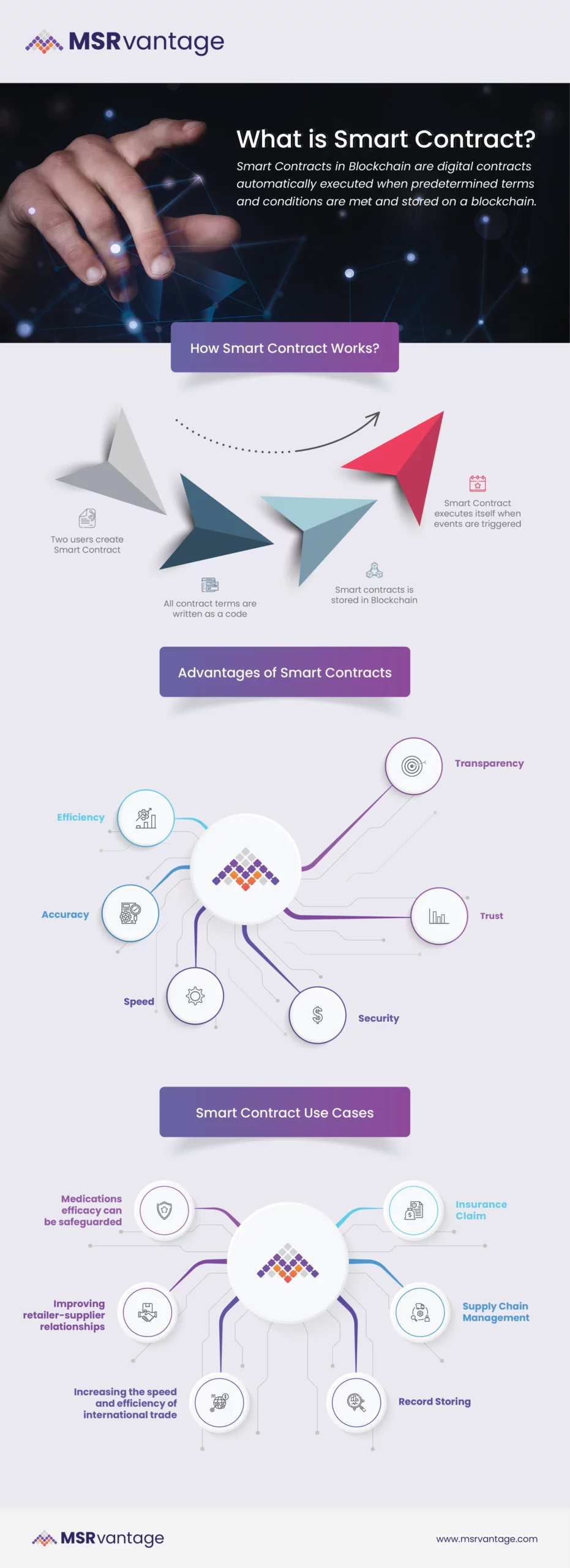Contracts govern most aspects of our professional and personal lives, and they are necessary for modern society to function. The recent exponential development & integration of blockchain technology and cryptocurrencies has influenced the financial industry has resulted in the creation of a new crypto-economy. Thanks to the appearance of blockchain in smart contracts, which are computer protocols designed to facilitate, verify, and enforce the negotiation and agreement automatically among multiple untrustworthy parties, next-generation decentralized applications without involving a trusted third party have emerged.
Not only that, but it also makes other components, such as applications that run on these platforms, more accessible. But what is a smart contract?
Smart Contracts: Introduction
Smart contracts are digital contracts and programs stored on a blockchain that are automatically executed when predetermined terms and conditions are met. It’s a self-executing contract in which the terms of the buyer-seller agreement are written directly into a set of lines of code. This code, along with the agreements, is distributed across a decentralized blockchain network. Transactions are trackable and irreversible, and the code controls their execution.

Working of a Smart Contract:
A smart contract is a business logic-encoding programme that runs on a dedicated virtual machine embedded in a blockchain or distributed ledger. The steps for putting smart contracts into action are as follows:
- Business teams work with developers to define the smart contract’s desired behaviour in response to specific events or circumstances.
- Simple events include payment authorization, shipment receipt, and utility meter reading thresholds.
- More sophisticated logic may be used to encode complex operations, like automatically releasing an insurance payment or determining the value of a derivative financial instrument.
- The logic is then created and tested using a smart contract writing platform. Following the completion of the application, it is sent to a separate team for security testing.
- It’s possible to use an internal expert or a company that has a speciality in screening the smart contract’s security.
- Once the smart contract has been approved by the expert company, it is then deployed on an existing blockchain or distributed ledger infrastructure.
- Once deployed, the smart contract is set up to listen for event updates from an “oracle,” which is essentially a cryptographically secure streaming data source.
- The smart contract executes once it obtains the required combination of events from one or more oracles.
The most widely used blockchain for running smart contracts is the Ethereum blockchain. Smart contracts in blockchain on Ethereum are typically written in “Solidity”, a programming language, and compiled for execution by the Ethereum Virtual Machine. Simplicity, Scilla, Ivy, and Bitcoin Script are other smart contract programming languages.

Advantages of Smart Contracts
Speed, efficiency and accuracy
The contract is immediately executed when a specific predefined condition is met. Owing to the digital and automated nature of smart contracts, dealing with paperwork is eliminated and the time spent rectifying errors that usually occur when filling out documents by hand.
Elevated Trust and Transparency
Due to an absence of third party involvement, there’s no information tampering for personal gain by any involved party and encrypted transaction records are shared among participants.
Greater Security
Owing to the encrypted nature of blockchain transaction, they are extremely difficult to hack. Furthermore, because each record on a distributed ledger is linked to the previous and subsequent records, if anyone is trying to hack it, they will require to change the entire chain to change a single record.
Savings
Blockchain in Smart contracts eliminates the need for intermediaries to handle transactions and the time delays and fees that come with them.
Applications of Smart Contracts: Use Cases
Let us look at some of the Smart Contracts use cases-
Medications’ efficacy can be safeguarded.
By increasing supply chain transparency through the application of smart contracts, we can reduce issues in the transport of life-saving medications. By integrating blockchain in Smart contracts tracking is possible of temperature-controlled pharmaceuticals through the supply chain to provide trusted, reliable, and accurate data to multiple parties.
Improving retailer-supplier relationships
Blockchain in smart contracts can be used to quickly resolve vendor disputes. They strengthen relationships with suppliers through real-time communication and increased visibility into the supply chain, resulting in more time for critical work and innovation.
Increasing the speed and efficiency of international trade
Another application of smart contracts is businesses can standardise rules and simplify trading options to reduce friction and risk while simplifying the trading process and expanding trade opportunities for participating businesses and banks.
Here are some more examples to see smart contracts use cases are becoming more widely distributed:
- In the first quarter of 2016, smart contract venture capital deals totalled $116 million, more than twice as much as the previous three quarters combined, accounting for 86% of total blockchain venture funding.
- Over $150 million has been raised by an Ethereum-based organization to experiment with and develop applications of smart contracts for their clients.
- To replace its current system, the Australian Securities Exchange is developing a blockchain-based post-trade solution
- 37 financial institutions are members of the Post-Trade Distributed Ledger Group, which was formed to investigate post-trade applications of smart contracts.
- Five global banks are developing proof-of-concept systems based on a smart contract-based trade finance and supply chain platform.
Capabilities of MSRvantage in Blockchain
MSRvantage Smart Contracts improve security by removing the possibility of deletion, manipulation, or revision by any party. As a result, a more verifiable method of integrating rules and policies is provided. MSRvantage Smart Contracts automates the contract execution process and effectively adjusts costs and compensations by eliminating intermediaries, with the goal of achieving a higher level of collaboration between different parties across the chain. Because it is tamper-proof, it ensures that transactions are carried out correctly. As a result, MSRvantage smart contracts can be used to automate and streamline business processes in a variety of industries.
Recent posts


Cultivating Sustainability: The Role of Traceability Solutions in Revolutionizing Agriculture Practices
In an era where the global population is on the rise and environmental concerns are at the forefront of discussions, the need for sustainable agricultural
Read more 


Transforming Mining: Risk Mitigation with Blockchain Technology
The mining industry is essential to modern life, providing the raw materials for everything from smartphones to infrastructure projects. However, it's also known for its
Read more 


The Power of Supply Chain Mapping Using Blockchain in Mining
The mining industry is a complex and critical sector that forms the backbone of many global supply chains. It encompasses the extraction, transportation, and processing




